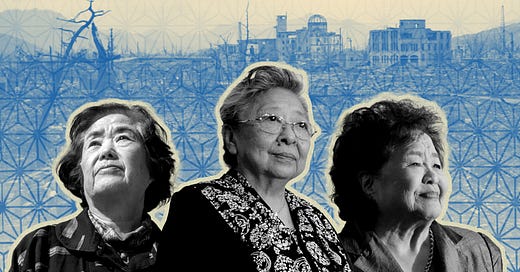Boobs, fascists, and the bomb
Welcome back to Memoir Monday—a weekly newsletter and quarterly reading series, brought to you by Narratively, The Rumpus, Catapult, Granta, Guernica, and Literary Hub. Each essay in this newsletter has been selected by the editors at the above publications as the best of the week, delivered to you all in one place.

Daughters of the Bomb: A Story of Hiroshima, Racism and Human Rights
by Erika Hayasaki
White mothers do their own kids of color no favors by claiming colorblindness. But my father did not mention such racial matters either. There is a phrase in Japan, “ba no kuuki wo yomu,” which means “to read the air.” It is an unspoken practice of sensing a person’s feelings, or a situation, without words. Decades later, when I had my own kids, my mother would tell me that she and my father watched a documentary together, early in their marriage, about the internment of Japanese-Americans. It ended, and they sat there in silence. Neither knew how to talk to the other about racism, much less their own kids. Uncomfortable facts fluttered in the atmosphere, never to be addressed.
The Fascist Within
by Vesna Maric
I, like every other Yugoslav, have had to examine the veracity of my memory, of that memory. I had to look at which part of that country, that ideal, was true and good, and what was oppressive and false. And although there are varied, often opposing versions of the same historical event, one thing has persisted throughout my readings, analysis and conversations on the subject: that Yugoslavia’s ending, in bloodshed, cannot be its only legacy, the only lesson we take away from its existence.
We Were All We Had
by Elham Khatami
Maryam and I gleefully watched Baba traverse the playground, from one piece of equipment to another, like an obstacle course. We followed him on the monkey bars, mimicked his jumping jacks, tried to sit on his back when he did pushups. I relished these outings for briefly pulling me out of our apartment, for helping me forget the feeling of limbo that hung over us each day. Our lives felt unwieldy, stretched taut across two countries, forever in search of ground to plant our roots.
Navigating the Dual Nightmare of an Opioid Epidemic and a Global Pandemic
by Maya Alexandri
“This city’s always been a heroin town,” my friend Trenchant, a singer-songwriter-guitarist observes. Long before oxycontin and the opioid crisis, the city had made opiates its drug of choice. And opiates in the city bled their way into the county.
Finally, at Fifty, I Can See Myself
by Lydia Kim
Yes, I participated in the betrayal of my face for most of my life, because it’s easy to do when your thoughts about beauty are colonized and your appearance is a battleground. But now, in some kind of golden midlife hour, when others tell me I am supposed to be fighting my face the hardest, I am more comfortable with it than I have ever been before.
Milked
by Veena Dinavahi
I notice them, now, when I step out of the shower. My self-image has fractured, narrowed to single aspects of myself. They sag, deflated and listless, reaching for the ground. The loose skin at my stomach crinkles as I bend over to dry off my legs. I wipe beads of water off the perfectly straight, perpendicular, decade-old scars on my thighs, always in groups of three.
Register now for the next Memoir Monday reading—one week from today! Featuring Billy-Ray Belcourt, Rose Andersen, Damon Young, and Alisson Wood.

Thanks for reading! If you enjoy Memoir Monday, please consider making a one-time or recurring contribution (if even a fraction of subscribers signed up to contribute $1 per month, Memoir Monday could be self-sustaining!) by clicking here.
You can also support Memoir Monday—and indie bookstores!—by browsing this Bookshop.org list of every book that’s been featured at the Memoir Monday reading series. It’s a great place to find some new titles to add to your TBR list!

If you received this email from a friend or found it on social media, sign up below to get Memoir Monday in your inbox every week!




